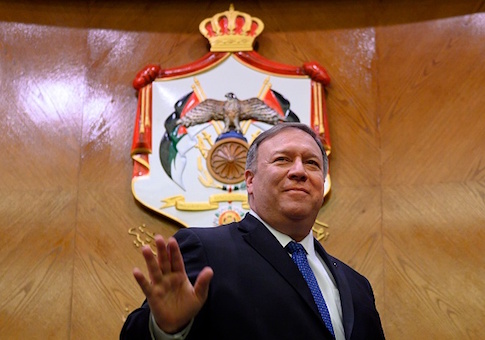AMMAN, Jordan—Secretary of State Mike Pompeo made an unannounced appearance in Iraq on Wednesday as part of a weeklong tour throughout the Middle East aimed at reassuring worried U.S. allies and galvanizing them to take a larger role in the fight against ISIS and Iran, according to multiple U.S. officials.
Pompeo's visit to Baghdad was not listed on his official travel itinerary for security reasons and some reporters were excluded from attending the daylong excursion. He met there with Iraqi Prime Minister Adil Abd al-Mahdi, Foreign Minister Mahammed Hakin, President Salih, Parliament Speaker Mohammed al-Halbousi, and U.S. embassy staff stationed in the country, U.S. officials told the Washington Free Beacon.
Pompeo's trip to the region, though planned beforehand, came just after President Donald Trump announced his decision to withdraw all U.S. forces from the fight against ISIS in Syria, a move that kicked-off days of confusion in the administration and among U.S. allies who viewed it as an abandonment of their security needs.
With the Syria withdrawal generating fears across the region, Pompeo's trip—initially meant to turn up the heat on Iran—has become an effort to reassure allies that Trump has no intention of vacating the region, despite his rhetoric. Misunderstanding of the administration's policy has been a cornerstone early in the trip, as the administration readjusts its rhetoric from an immediate withdrawal to a more lengthy and orderly pullout.
Pompeo's next stop will be in Cairo, Egypt, where he will again meet with top leaders and deliver a major address that U.S. officials say will be a rebuke of the Obama administration's foreign policy priorities. One of Obama's first major speeches after taking office occurred in the same city and set the tone for his administration.
Back in Jordan Tuesday evening, where Pompeo began his trip, the secretary of state met with Jordanian Foreign Minister Ayman Safadi and the country's leader, King Abdullah II, to discuss the threat posed by Iran and its expansionist foreign policy that has roiled U.S. allies across the region.
Regional leaders have been clear about their fear of Iran, which has launched scores of attacks against U.S. allied forces in Syria and elsewhere in the years since the Obama administration freed up billions of cash windfalls for the Islamic Republic as part of the now-defunct nuclear deal.
Jordan has emerged as perhaps the top U.S. ally in this fight, a point emphasized by Pompeo as he spoke at the country's foreign ministry Tuesday. The country is heavily reliant on the United States for critical security aid and was one of several regional allies to express surprise and concern over the Trump administration's decision to withdraw American forces from Syria.
"We had a good conversation today," Pompeo said during a joint press conference. "I reaffirmed our commitment under President Trump to working with King Abdullah's government on many of our shared priorities. The United States remains firmly committed to Jordan's domestic stability and security, and we will undertake that work in a true spirit of partnership."
Pompeo worked to reassure Jordanian leaders that the United States is not vacating the region, touting joint counterterrorism efforts that have largely been funded by the State Department.
"Just last year, our nations unveiled a new counterterrorism training center less than 50 miles south of where we stand even as I speak," Pompeo said. "The State Department, too, was proud to fund and construct that facility through our Antiterrorism Assistance Program. It is sharpening our terror-fighting tools and helping Jordan build its already strong capacity to fight terrorism."
The Trump administration and Jordanian leaders appear to be on the same page with regards to the fight against Iran's expansion across the region.
"We also look forward to working continually to counter Tehran's malign influence in the region," Pompeo said. "Jordan made a powerful statement by recalling its ambassador to Tehran last year in protest of the Iranian regime's flagrant transgressions of security and sovereignty. I also want to thank the Government of Jordan for its helping in—help to combat Iran's attempt to evade sanctions."
"This is about a combined understanding that the most significant threat to the region is Daesh and the Islamist revolution, and their revolutionary efforts in the region," he said.
Jordan's Safadi did not hesitate to express frustration with Iran, but did not go nearly as far as Pompeo in his criticism.
"We all have problems with Iran's expansionist policies in the region. We all want to make sure that whatever threat there is mitigated," Safadi said. "All Arab counties, and I think the United States too, would want healthy relations based on the principle of nonintervention in the internal affairs of the other, and respecting the sovereignty of other countries. If that is achieved, if everybody abides by international norms of behavior, then there'll be no problem. So for as long as there are policies that are counter to these principles, then we will continue to have issues with their policy."
Later Tuesday evening, Pompeo attended a meeting with Safadi and King Abdullah II. Few details of that powwow were disclosed to reporters traveling with Pompeo.
During that meeting, Pompeo "reaffirmed the United States steadfast support for Jordan" and "reaffirmed the United States' steadfast support" for the country, according to State Department officials.
